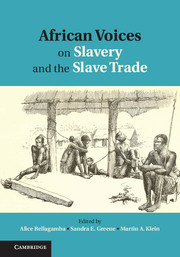Book contents
- African Voices on Slavery and the Slave Trade
- African Voices on Slavery and the Slave Trade
- Copyright page
- Contents
- Figures
- Contributors
- Foreword Beyond the Printed Word
- Introduction Finding the African Voice
- Part One Remembering Slavery and the Slave Trade
- Part Two The Verbal Arts and Everyday Objects
- Part Three Documenting Our Own Histories and Cultural Practices
- Part Four Slavery Observed: European Travelers’ Accounts
- 19 Introduction:
- 20 The Story of Saaba
- 21 Zenneb and Saint-André’s Cruise Up the Nile to Dongola
- 22 The Ordeals of Slaves’ Flight in Tunisia
- 23 African Slavery and the Slave Trade in the Manuscript of Jean Godot
- Part Five Administrative Records
- Part Six Legal Records
- Part Seven Recorded Encounters with the Enslaved: Christian Workers in Africa
- Part Eight Documents from Muslim Africa
- Part Nine Living with the Past
- Index
23 - African Slavery and the Slave Trade in the Manuscript of Jean Godot
from Part Four - Slavery Observed: European Travelers’ Accounts
Published online by Cambridge University Press: 05 April 2013
- African Voices on Slavery and the Slave Trade
- African Voices on Slavery and the Slave Trade
- Copyright page
- Contents
- Figures
- Contributors
- Foreword Beyond the Printed Word
- Introduction Finding the African Voice
- Part One Remembering Slavery and the Slave Trade
- Part Two The Verbal Arts and Everyday Objects
- Part Three Documenting Our Own Histories and Cultural Practices
- Part Four Slavery Observed: European Travelers’ Accounts
- 19 Introduction:
- 20 The Story of Saaba
- 21 Zenneb and Saint-André’s Cruise Up the Nile to Dongola
- 22 The Ordeals of Slaves’ Flight in Tunisia
- 23 African Slavery and the Slave Trade in the Manuscript of Jean Godot
- Part Five Administrative Records
- Part Six Legal Records
- Part Seven Recorded Encounters with the Enslaved: Christian Workers in Africa
- Part Eight Documents from Muslim Africa
- Part Nine Living with the Past
- Index
Summary
- Type
- Chapter
- Information
- African Voices on Slavery and the Slave Trade , pp. 249 - 262Publisher: Cambridge University PressPrint publication year: 2013

